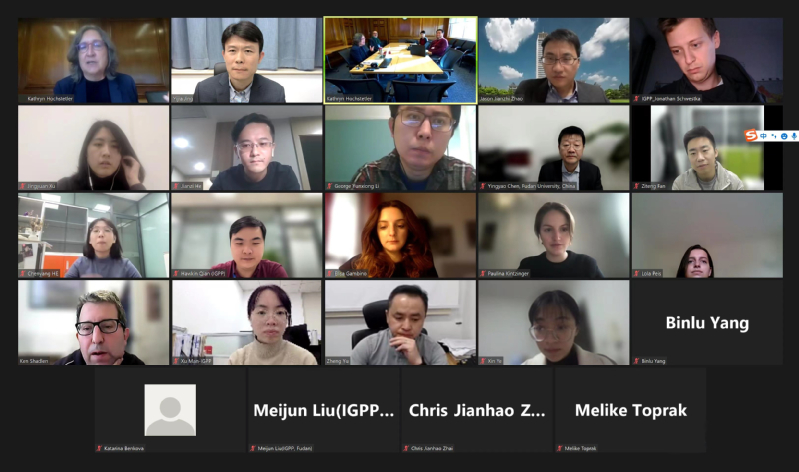LSE-Fudan University Research Workshop on “China and the Global South”

On 8 November 2022, the Research Workshop on China and the Global South was held online, jointly organised by the LSE International Development, the Institute for Global Public Policy (IGPP) of Fudan University, the LSE Global South Unit and the LSE Global China Working Group.
After an extended period where international travel was brought to a stand-still, it was heart warming that on November 8, 2022, the LSE Department of International Development (ID) and Fudan University’s Institute for Global Public Policy (IGPP) successfully cohosted a “Research Workshop on China and the Global South”, as a hybrid event. ID Department Head Professor Kathy Hochstetler remarked that this workshop has turned out to be the biggest research-related event this year (2022) for the department.
The workshop started with welcoming remarks by Professor Hochstetler, and Yijia Jing, Dean of the IGPP of Fudan University. Professor Jing summarized the ongoing cooperation between Fudan IGPP and the LSE in international development studies, and how the workshop represented the next step in the collaboration between the two universities which started with Fudan colleagues visiting the LSE in 2018 to initiate the cooperation, including meetings with then LSE ID Department Head Professor Ken Shadlen, and Professor Chris Alden and Dr. Alvaro Mendez Co-Director of the Global South Unit at the LSE, as well as LSE School of Public Policy.
Professor Hochstetler noted that the workshop was being held as part of the Program for the Mayling Birney Global Scholar Fellowship at the LSE, with Gregory Chin of York University (Canada) as the Birney Global Scholar from Autumn 2022 until Spring 2023, and participating in person at the workshop in London.
LSE-Fudan University Research Workshop on “China and the Global South”. Image credit: igpp.fudan.edu.cn.
The workshop featured strong participation by leading faculty members from Fudan University and the LSE, and ‘rising star’ graduate students. Impressive leading research findings were presented during three sessions. Associate Professor Vic Li from the Education University of Hong Kong, Department of Social Sciences also attended the workshop in London.
The theme for the first session was “South-South Development Banks and financial cooperation”, and it was chaired by Professor Hochstetler. Associate Professor Jianzhi Zhao at Fudan University presented the findings in his forthcoming coauthored article in International Organization that the World Bank’s infrastructure financing decreased for founding members of the Asian Infrastructure Investment Bank (AIIB) after the AIIB was established in 2016, and he advanced a dynamic multi-level latent factor model to address the causes (highlighting ‘causal inference’). Fudan Professor Yu Zheng discussed the evolution of China’s foreign aid system, specifically changes after the creation of China International Development Cooperation Agency (CIDCA), such as more market-oriented aid strategies, emphasis on fiscal and environmental sustainability and China’s use of bilateral and multilateral channels. Professor Zheng also highlighted continuity in the role of Ministry of Commerce, which continues to oversee the implementation of China’s foreign assistance projects despite the creation of CIDCA. Fudan Professor Zhu Jiejin detailed his innovative research on “institutional isomorphism” as seen in the case of the AIIB, what Zhu observes as the increasing convergence between the AIIB and the longer-established multilateral development banks in terms of operational practices, the scope of business, and approaches to environmental and social standards. Professor Zhu identified the influence of the European members in the AIIB as the major factor behind this pattern of convergence.
The theme of the second session was “South-South Cooperation and Learning”, and it was chaired by Dean Yijia Jing Dr. Elisa Gambino of the LSE Department of International Relations, a specialist on China-Africa relations, presented her field research on case studies of Chinese migrants in Africa, and their varying business practices of differing Chinese private businesses in Ghana, and their risk-reward-return experiences. Professor Chen Yingyao discussed the experiences of Fudan University’s School of Public Health and China’s pharmaceutical companies in building capacity in the health sciences in Africa, in his presentation on “Global Health Cooperation in the Belt and Road.” LSE ID PhD Candidate Tin El-Kadi on the strategy of Huawei and ZTE in building their corporate business through services contacts in Algeria and Northern Africa, in her presentation, “Learning along the Digital Silk Road: Technology Transfer, Power and Chinese ICT Corporation in North Africa.” Ms. El-Kadi has conducted more than 100 field interviews in Africa for her doctoral thesis, including with Huawei staff.
The third and final session was on “South-South investments and development assistance” and was chaired by the Birney Global Scholar Gregory Chin. Dr. Alvaro Mendez, co-director of LSE Global South Unit, detailed his field research on the evolving role of the New Development Bank (NDB) and the AIIB in Latin America, and Dr. Mendez highlighted how the work of these China-supported MDBs represented the ‘new’ trends and patterns of development assistance. Dr. Yunxiong Li in LSE Department of Geography presented on the mining of critical rare metals and how changes in their future availability could affect the transition to renewable energy. Finally, LSE ID PhD Candidate Yuezhou Yang drew on her pioneering findings in her doctoral thesis, and more then 150 field interviews in Africa from 2020-2022, to present on, “Land Rights and the Structure of Chinese Investment in Zambia Agricultural Land”,. Ms. Yang outlined her modified typology of four types of Chinese investors in agricultural land in Eastern Africa, and why this variation matters for developing a more nuanced understanding of Chinese investors in Africa.
IGPP Dean Yijia Jing and ID Department Head Hochstetler both noted the high quality and relevancy of the research that was presented throughout the day from start to finish. The researchers on both sides plan to maintain their research contact, continue cooperating, and hope to meet again next year in person in 2023. The participants discussed potential publications that could result from the workshop. Both sides noted the important new publications at Fudan University, with IGPP Dean Yijia Jing as the lead editor of the journal Global Public Policy and Governance, and Governing China in the 21st Century book series (co-edited with Chen Zhimin), both published by Springer. This book series includes the landmark Fudan-LSE book project New Development Assistance: Emerging Economic and the New Landscape of Development Assistance (2020) edited by Yijing Jing, Alvaro Mendez and Yu Zheng.
Gregory T Chin is Associate Professor in the Department of Political Science, York University (Canada). He co-directs the Emerging Global Governance Project with Global Policy journal. He has published widely on the political economy of China and international money and finance. From 2000 to 2006, Chin served in the Government of Canada, Department of Foreign Affairs and International Trade, the Canadian International Development Agency, and the Canadian Embassy in Beijing. Gregory Chin is also a Mayling Birney Global Scholar.
Kathy Hochstetler is Professor and Head of the Department of International Development at the LSE. She has attended previous COPs and written about the role of the BASIC countries (Brazil, China, India, South Africa) in the climate negotiations. Her most recent book is Political Economies of Energy Transition: Wind and Solar Power in Brazil and South Africa (Cambridge University Press, 2021).
This first appeared on the LSE's International Development blog. The views expressed in this post are those of the author and in no way reflect those of the International Development LSE blog or the London School of Economics and Political Science.
Photo by jiawei cui



